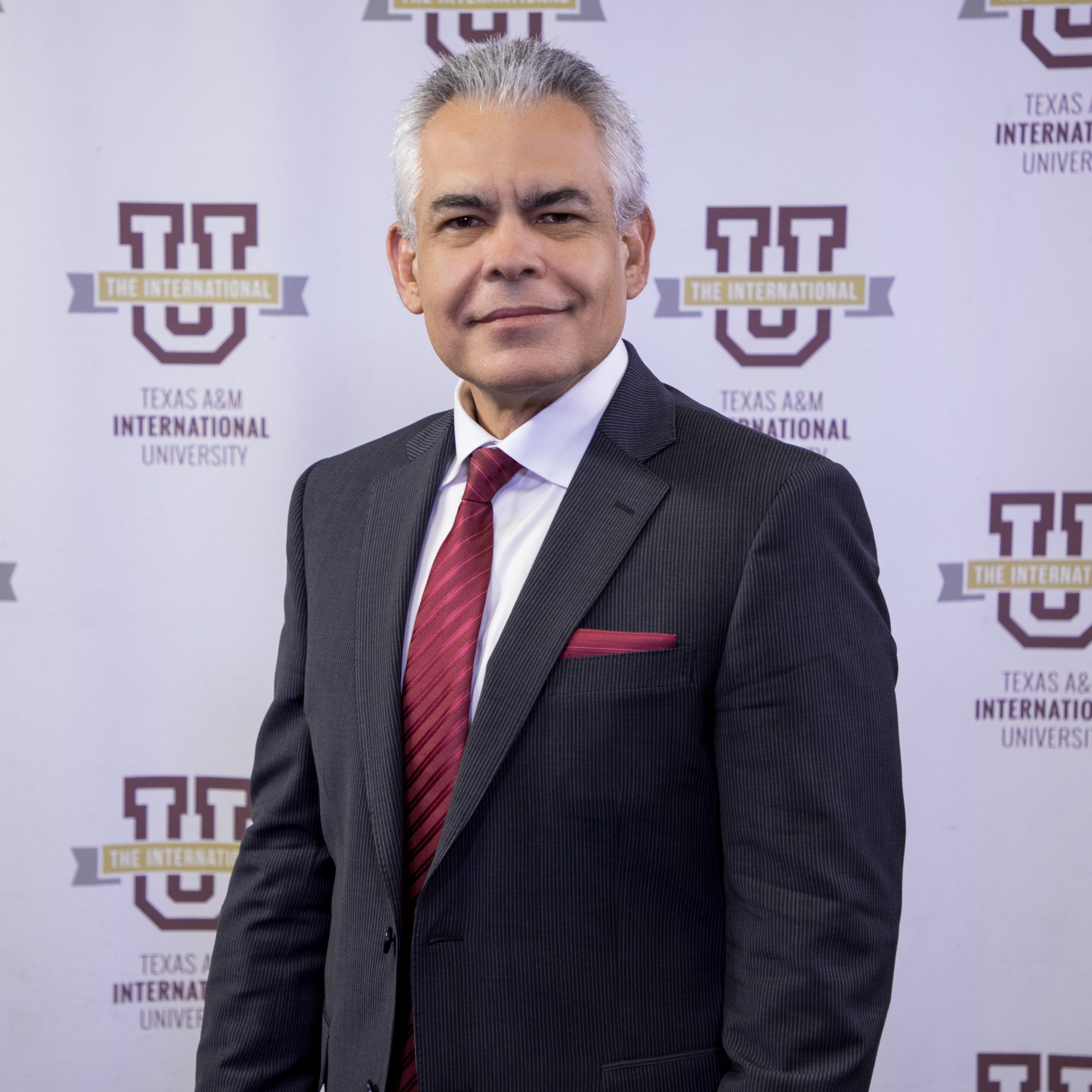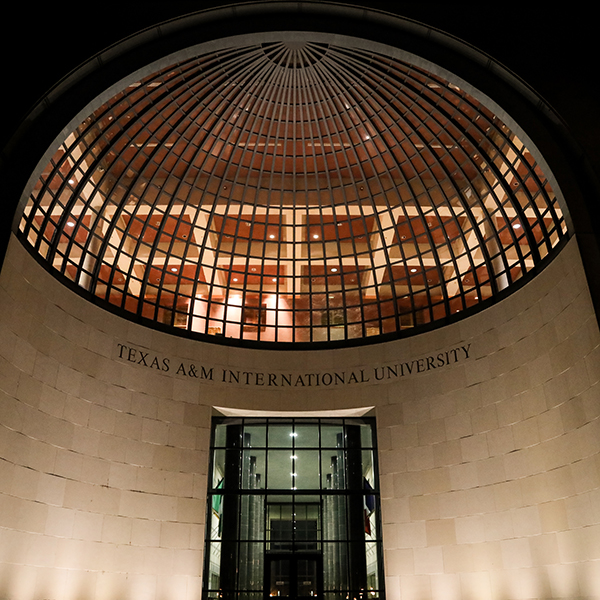Let's Meet Dr. Luis Pérez-Batres, Dean of the A. R. Sánchez School of Business

This Fall at Texas A&M International University (TAMIU) some new leadership faces join new and returning undergraduate and graduate students and faculty.
TAMIU has named three new deans, including the Dean of the A. R. Sánchez, Jr. School of Business, Dr. Luis Pérez-Batres.
Let’s meet Pérez-Batres and get to know his story.
Can you tell us a bit about your background and what initially drew you to the role of Dean at the A. R. Sanchez, Jr. School of Business?
It has been a blessing to have had the opportunity to study and hold jobs at seven excellent universities within the past 25 years: Illinois (MS in Finance), Texas A&M (PhD MGT/IB), Appalachian State (Assistant Professor), Central Michigan (Professor & Department Chair), Michigan (Visiting Scholar), Missouri State (Professor and Department Head), and now Texas A&M International (Dean & Professor). Before joining TAMIU, I held administrative responsibilities for the better part of a decade. In my “previous life,” after graduating from Monterrey Tech-Laguna Campus in Torreón, where I grew up and became used to warm summer days, I worked for roughly 10 years in banks and brokerage houses.
My academic and life experiences in México and the United States have inspired a vision for the A. R. Sanchez, Jr. School of Business. I see us as a catalyst for the continuous growth of Laredo as an international business hub. In my fifth month already, I can categorically say that Laredo feels like home to my wife and me. Having family close by, Houston and Monterrey, is a bonus!
Can you share some of your research interests with us?
I am intrigued by topics related to individual or firm performance and the role of the environment in explaining success or failure, particularly within a radical change context. My most cited paper is about how stakeholder pressures determine strategic choice. My recently accepted paper, and the first with TAMIU affiliation, uses the 2016 presidential election and Dodd-Frank rollback as a backdrop to measure bank adaptability and success to sudden regulatory changes. My first paper was also on radical adaptation—Is there a liability of localness? How emerging market firms [banks] respond to regulatory punctuations.
Our commitment to the success of our students and Laredo’s business community is unwavering. We have initiatives in place that aim to support our region’s continuous growth. The Sanchez School of Business is not just a part of the community, but an active participant in its development. We are all in!
What are your initial impressions of TAMIU, Laredo, and how do you feel the A. R. Sanchez, Jr. School of Business serves as a catalyst for the city's continuous growth as an international business hub?
I am impressed by the quality of our faculty/staff and the business community support; they hold us in high regard. It is also extraordinary to have so many centers and programs of excellence under one roof, such as the Center for the Study of Western Hemispheric Trade, the Texas Center for Border Economic and Enterprise Development, the Small Business Development Center, and the Banking Academy, and a solid PhD in International Business Program, celebrating its 20th anniversary.
Our commitment to the success of our students and Laredo’s business community is unwavering. We have initiatives in place that aim to support our region’s continuous growth. The Sanchez School of Business is not just a part of the community, but an active participant in its development. We are all in!
What are your immediate priorities for the School of Business in your first year?
We aim to leverage and maximize our current capabilities with the explicit intention of further supporting TAMIU’s vision of becoming a premier international university. Our immediate and top priority is to deliver on this ideal. In doing so, the Sanchez School of Business actively engages with the business community through its many centers of excellence and programs. During this very academic year, we have already interfaced with key members of the community, received meaningful support for the establishment of our new Banking Academy, hosted and invited world-renowned scholars, taken steps to continue our AACSB accreditation, planned new action-based learning and innovative pedagogy protocols, and supported academic research. In short, we have prioritized the creation and dissemination of knowledge and enjoyed the support of our business community, academic peers, and accrediting bodies.
How do you plan to build upon the existing strengths of the A. R. Sanchez, Jr. School of Business in launching new programs and initiatives?
The first step is to ensure that our Sanchez School team receives complete support to continue flourishing professionally and deliver on our mission by enabling our students and business community to achieve success. Easily identifiable strengths include student and community engagement through our programs and centers of excellence, faculty research prowess, and the high commitment of our staff—admins and advisors.
The second step is to ensure we continue to meet the needs of our students and the business community. To restate, we must create and maintain an environment where we continue to flourish.
What are some challenges facing business education today, and can you share strategies you will employ to address these challenges?
Key challenges include:
- Justifying the degree's value— its relevance as determined by the marketplace.
- Bridging the industry-academic gap—the divide between theoretical knowledge and practical application. Examples: AI, credentials and certifications, career readiness skills, and societal values.
- Curriculum Obsolescence— keeping pace with rapidly changing business practices.
- Ensuring Accessibility and Affordability: Making quality business education accessible to students from all walks of life.
To successfully meet these challenges, we have built partnerships with industry leaders and attained their support, invested in faculty development and training, revised our curricular offering, piloted co-curricular platforms, used scholarship funds to enhance accessibility, and organized events where businesses and students can find space to meet and network. These strategies address the specific challenges of justifying the degree's value, bridging the industry-academic gap, managing curriculum obsolescence, and ensuring accessibility and affordability.
How do you envision enhancing the relationship between the School of Business and the local community, including businesses and industry partners?
By consistently connecting industry and academia (students and professors). We can invite industry leaders to become advisory board members of our centers and programs. To ensure student interaction, we must continue to build strong student organizations and offer complementary co-curricular activities that further enhance their career readiness skillset.
Can you share your thoughts on the role of innovation and technology in business education and how you plan to incorporate these elements into the curriculum?
Although relevant and even indispensable, innovation and technology are a means to an end. By leveraging innovation and technology, such as AI, business simulations, or smartbooks, we aim to enhance action-based learning. We are exploring incorporating these elements into co-curricular platforms, industry certifications, or digital academic badges/credentialing to meet the needs of students and business communities across the region and beyond. This approach will ensure that our curriculum and overall student experience remain at the forefront of business education and allow our students to succeed in their chosen fields and around the globe.
Please share your thoughts on TAMIU's goal to become an R2 institution and how the School of Business plans to support this goal.
Becoming an R2 University will enhance TAMIU’s reputation by recognizing our commitment to research excellence. This, among other benefits, will result in a higher societal impact throughout the region.
The Sanchez School of Business readily supports this initiative. Our faculty’s research prowess compares very well to most R2 schools and some R1s. Likewise, we are very proud of our Ph.D. students’ research and successful placement. We graduated 10 students in MGT and FIN during the previous two academic years. With corresponding resources, the Sanchez School of Business could further support TAMIU’s bid for R2 status by accepting Ph.D. students in our Accounting and MIS and Data Analytic Ph.D. concentrations – Accounting is our largest undergraduate major and offers a face-to-face graduate degree; MIS faculty include some of TAMIU's most prolific and widely cited researchers. Having doctoral students in these two additional concentrations could mean graduating 10+ Ph.D. students per year, or half of the current Carnegie Classification requirement.
What are your goals for increasing student engagement and success within the School of Business? How do you plan to support and collaborate with faculty to advance research and academic excellence in business schools?
We aim to increase student engagement by being intentional about the time spent and the quality of the activities we create. To this end, we are working on action-based co-curricular platforms that facilitate student involvement: School events, student organizations, study abroad, simulations, and scholarships.
We celebrate faculty research by signaling its relevance and rewarding/supporting commitment. Signaling includes hosting world-renowned scholars and communicating our faculty’s research achievements across campus and the larger community. It also includes state-of-the-art databases, professorships, summer stipends, and a travel budget for conference presentations.
Our aim is to continue finding avenues to showcase student engagement and faculty research prowess as sources of strength for elevating the Sanchez School of Business's good reputation.
What is your long-term vision for the Sanchez School of Business, and how do you plan to achieve it?
In our journey towards fulfilling TAMIU’s vision, the Sanchez School of Business can become a premier international business school and a top destination for undergraduate and graduate students focused on international business within our concentration areas of accounting, transportation and logistics, decision science, finance, economics, management, management information systems, and marketing.
We plan to achieve this ambitious goal by counting on the University's support, partnering with business leaders, and meeting the region’s top priorities. We will inspire students to engage in action-based learning to complement their curricular obligations—e.g., study abroad, internships, and student organization involvement—and empower our faculty and staff to engage in meaningful research and superior student service.
In short, we must continue building on activities that exude quality and position us to achieve a premier status. Examples include the excellence observed in several of our programs and centers.
Can you share some of your hobbies with us?
Absolutely. I enjoy outdoor cycling and walking, especially in large towns. I also enjoy taking pictures of nature, animals, and landscapes. Last but certainly not least, I love spending time with friends, family, and students!
Would you like to add any other thoughts or ideas?
I am thrilled to serve as the Dean of the Sanchez School of Business alongside an outstanding group of passionate professionals who are changing the trajectory of students’ lives, creating a legacy, and elevating South Texas and beyond!
Within these first 22 weeks, I have met extraordinary individuals who genuinely care about our students, school, and region. I pray to God to continue sending me people into my path who are of good heart and committed to the Sanchez School of Business project!
To learn more about the A. R. Sanchez, Jr. School of Business, visit https://www.tamiu.edu/arssb/, email jessica.lopez@tamiu.edu, call 956.326.2480 or connect on social channels X/Twiter, Facebook, YouTube and Instagram.

Dr. Luis Pérez-Batres, Dean of the A. R. Sánchez, Jr. School of Business
